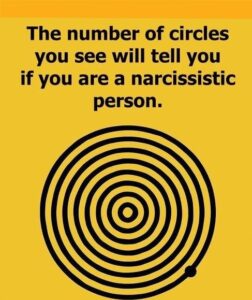How Many Circles Can You See? Your Answer Might Reveal More About You Than You Think

Sometimes, an image is more than just a clever trick for the eyes—it’s a doorway into how we think, notice, and process the world. A recent viral optical illusion, featuring what looks like a hypnotic swirl of shapes, has been sparking conversations for an unusual reason. Its bold claim? The number of circles you spot could say something about your personality—and maybe even hint at narcissistic traits.
At first glance, it’s easy to get lost in the spiral effect, as if you’re staring down a moving tunnel. But the illusion isn’t in motion at all—it’s a precise arrangement of overlapping, perfectly round circles. The challenge is deceptively simple: count them.
It’s harder than it sounds. The way your brain separates patterns, edges, and depth from visual clutter isn’t just a matter of eyesight; it’s also tied to attention, focus, and how much detail you naturally notice in your surroundings.
Here’s what your circle count could suggest about you:
-
Fewer than 7 circles: You’re likely someone who thrives on seeing the bigger picture. Details don’t distract you—you keep your eyes on the main goal. This can give you confidence and ease in social settings, but it might also mean you lean toward seeking acknowledgment from others. While that doesn’t make you a narcissist, it does suggest you might enjoy a little extra attention and recognition.
-
Between 7 and 9 circles: You strike a balance between broad vision and detail-oriented thinking. You can zoom out to understand the overall situation but also narrow in when precision is needed. This often points to healthy self-esteem without tipping into vanity—you like being valued, but it’s not your driving force.
-
10 or more circles: You probably have a sharp eye for subtle shifts—whether in a room’s layout, a friend’s tone, or the fine print of a contract. This level of awareness often pairs with modesty and a reflective nature. People in this category tend to focus more on self-improvement and quiet achievements rather than public praise.
Of course, this “personality reveal” is more fun than fact—it’s not a scientific assessment. But illusions like this are fascinating because they remind us how differently each person experiences the same visual scene.
In the end, whether you counted five, ten, or fifteen circles, the real value isn’t in the label—it’s in what the exercise makes you notice about yourself. In a world that rushes past details, taking a few moments to slow down, look closer, and reflect might be the most insightful thing you can do.